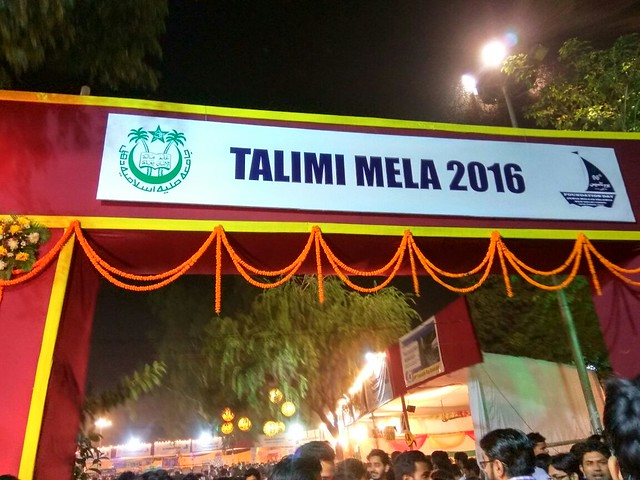By TwoCicrles.net, Staff Reporter
Delhi: The 96th Foundation Day Celebrations of Jamia Millia Islamia started with much fanfare in the Jamia campus on Thursday, October 27 with a three-day cultural and literary extravaganza.
Inaugurating the Talimi Mela as part of the celebrations, UGC Chairman, Professor Ved Prakash who was chief guest for the event said, “96 years ago when the foundation of Jamia Millia Islamia was laid, its founders would have aspired to create the best institution in the world. It’s time to analyse where we want to see ourselves 10-15 years from now and strategise for mid-course corrections, if needed.”

“Universities and colleges are the most enduring institutions on which society pins its highest hopes especially when it is faced with a problem of any kind, a Talimi Mela like this, illustrates the power of Taleem,” he added.
Professor Prakash flagged the importance of introspection by institutions to know where they stood vis-a-vis other higher educational institutions in India and globally. Addressing the students, he said that there were three essentials for attaining progress. “Staying put as a life-long learner, dreaming inspiring dreams and that if dreams were not realised we should change our path not principles… we need to learn the act of transforming failures into success, learn from mistakes of others and need to play the curved ball.”
He observed that “we were increasingly becoming a reactionary society with little patience to listen to contrarian views and that it was important to treat every individual with dignity.”
He urged the students to emulate those in search of wisdom but cautioned them to be wary of those who claimed to know the truth which he likened to a “well-chiselled diamond”. He underscored the importance of ‘having a library at home instead of spending on clothes, cars and housing.’
The Guest of Honour, Dr. S.Y. Quraishi, former Chief Election Commissioner, said that he was happy to participate in the Talimi Mela that he had been hearing of since his childhood but only now got an opportunity to attend it.
An alumnus of Jamia, Dr Quraishi asked the students to concentrate on education and learning. He said that Islam which was a pioneer in education and granted equal rights to women 1,400 years ago had now strayed away from both. Islam was a religion that made it mandatory for both boys and girls to attain an education but now girls were unable to pursue it.
Referring to the ongoing debate on Muslim Personal Law, Dr Quraishi said, “Personal law reform should come from within the community and not be imposed. At the same time the community must introspect and be open to change with time.”
He also gave a power-point presentation on the functioning of the Election Commission and conduct of elections in the world’s largest democracy which has been hailed as an outstanding model by countries across the world.
He presented copies of his book, An Undocumented Wonder: The Making of the Great Indian Election, to Professor Ved Prakash and Vice Chancellor, Professor Talat Ahmad.
Ahmad said that he was happy to inform that the university was fulfilling its mandate to make education accessible to children from marginalised and weaker sections of society. He cited the bridge course under which school and madrassa drop-outs were being given intensive one year teaching and training at JMI under the aegis of ‘Nai Manzil Scheme’.
He further said that as part of its social responsibility, the university has empowered 40 women from the community who are now successfully running a canteen on campus called ‘Dastarkhan’. Prof Ahmad said that “in another 4 years Jamia Millia Islamia will be celebrating its 100 years and he was hopeful that university will continue to get full support from the UGC and the government.”
Earlier, both Professor Prakash and Dr Quraishi along with the Vice Chancellor, JMI were presented with a guard of honour following which the dignitaries inaugurated the three-day Talimi Mela in which students and faculty have set-up close to 50 stalls displaying their latest innovations and creativity.
Cultural programmes that included singing competitions, screening of films, mushaira were organised as part of the ongoing festivities.

